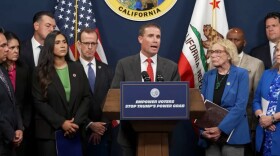San Diego stands to see a significant improvement in air quality if the nation’s trucking fleet goes all electric.
The state is already pledging to stop the sale of new cars with internal combustion engines by 2035 as a key strategy to reduce greenhouse gas emissions.
The American Lung Association’s “Delivering Clean Air” report concludes electrifying all freight hauling trucks by 2050, could save billions of dollars in health care costs.
“We found 735 billion dollars in public health benefits is on the table if we make strong investments in cleaning up the truck sector, partnering that with clean energy and really making a strong push to zero emission technology,” said Will Barrett, the Lung Association’s national director for clean air.
The report estimates nearly 67,000 premature deaths can be avoided if diesel pollution is eliminated. That means 1.75 million fewer asthma attacks and 8.5 million fewer missed workdays linked to pollution related illnesses.
The Association is urging federal and state officials to enact policies that move the freight hauling fleet in that direction.
Medium and heavy duty trucks only represent 6% of the on road fleet in 2020, but they accounted for 59% of the nitrogen oxide pollution and 55% of the particle pollution generated.
Changing those vehicle engines to electrical power could have important implications locally.
San Diego ranks in the top 10 of the most ozone polluted cities in the United States. Barrett said that means San Diego is among the regions with the most to gain.
“So, it’s really important when we’re looking at where these benefits can accrue the most, that we take heart,” Barrett said. “San Diego can make a major leap in air quality and health equity by supporting the transition to zero emission trucks.”
Barrett said getting rid of diesel-powered trucks will also help disadvantaged communities like Barrio Logan and National City.
Those neighborhoods have long suffered from pollution coming from diesel powered trucks rumbling down their streets.
Eliminating pollution from freight hauling diesel-powered trucks will get pollution out of neighborhoods that have long suffered higher respiratory risks than those without major trucking routes.







